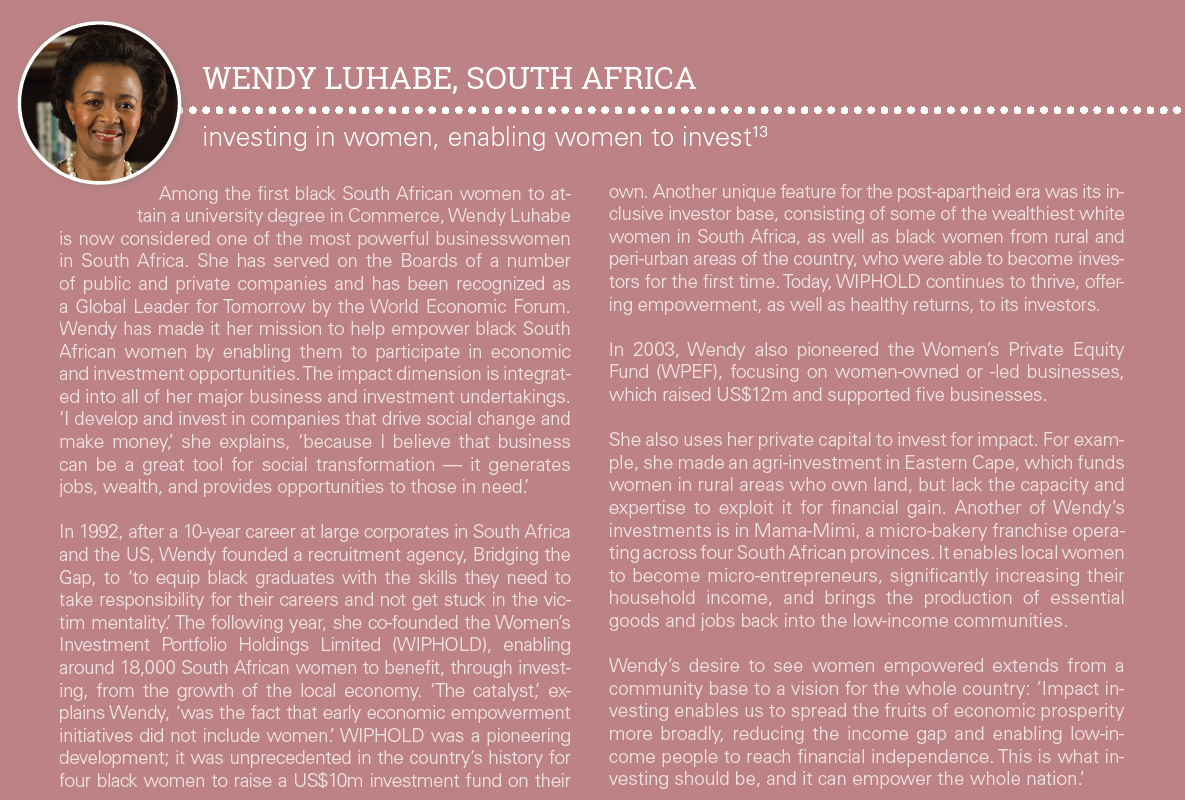Among the first black South African women to attain a university degree in Commerce, Wendy Luhabe is now considered one of the most powerful businesswomen in South Africa. She has served on the Boards of a number of public and private companies and has been recognized as a Global Leader for Tomorrow by the World Economic Forum.
Wendy has made it her mission to help empower black South African women by enabling them to participate in economic and investment opportunities. The impact dimension is integrated into all of her major business and investment undertakings.
‘I develop and invest in companies that drive social change and make money,’ she explains, ‘because I believe that business can be a great tool for social transformation — it generates jobs, wealth, and provides opportunities to those in need.’
In 1992, after a 10-year career at large corporates in South Africa and the US, Wendy founded a recruitment agency, Bridging the Gap, to ‘to equip black graduates with the skills they need to take responsibility for their careers and not get stuck in the victim mentality.’
The following year, she co-founded the Women’s Investment Portfolio Holdings Limited (WIPHOLD), enabling around 18,000 South African women to benefit, through investing, from the growth of the local economy. ‘The catalyst,’ explains Wendy, ‘was the fact that early economic empowerment initiatives did not include women.’ WIPHOLD was a pioneering development; it was unprecedented in the country’s history for four black women to raise a US$10m investment fund on their own. Another unique feature for the post-apartheid era was its inclusive investor base, consisting of some of the wealthiest white women in South Africa, as well as black women from rural and peri-urban areas of the country, who were able to become investors for the first time. Today, WIPHOLD continues to thrive, offering empowerment, as well as healthy returns, to its investors. In 2003, Wendy also pioneered the Women’s Private Equity Fund (WPEF), focusing on women-owned or -led businesses, which raised US$12m and supported five businesses.
She also uses her private capital to invest for impact. For example, she made an agri-investment in Eastern Cape, which funds women in rural areas who own land, but lack the capacity and expertise to exploit it for financial gain. Another of Wendy’s investments is in Mama-Mimi, a micro-bakery franchise operating across four South African provinces. It enables local women to become micro-entrepreneurs, significantly increasing their household income, and brings the production of essential goods and jobs back into the low-income communities. Wendy’s desire to see women empowered extends from a community base to a vision for the whole country: ’Impact investing enables us to spread the fruits of economic prosperity
more broadly, reducing the income gap and enabling low-income people to reach financial independence. This is what investing should be, and it can empower the whole nation.’
Click HERE for the article.

How do we access help from such people like Mrs Luhabe? Its not easy to even find mentors like her or just mentors and its demoralizing at times.